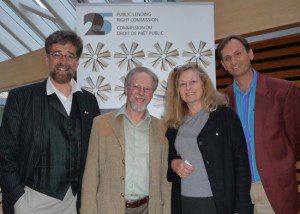
Imagine for a moment, a shopper comes into your retail store. The shopper browses along a couple of aisles, pulls a few items from the shelves or the racks, puts them in a shopping basket. Then he leaves your store without paying a penny. Or, imagine a client enters your office. You’re a doctor, a dentist, a lawyer, an accountant or anyone offering a professional service. How likely is it that client will leave your office without squaring his account? Not very likely.
If the shopper or client did, you’d consider it shoplifting or theft and you’d probably call the police.
Up until 25 years ago, that’s exactly the way authors, whose books are housed in Canadian public libraries, felt. Until the introduction of the Public Lending Right (PLR) fee – paid to those who write and publish their works and then have them made available to the public across Canada – authors received no compensation from public libraries. In 1986, for the first time, the federal government assigned both bureaucrats and funds to ensure that money – a fee, if you will – was paid to the authors of those books. It was called the Public Lending Right fee. And I can tell you – as a professional writer – it was an historic moment.
But don’t take my word for it. No less than Margaret Atwood said the same, in a booklet of testimonials released this week by The Writers’ Union of Canada.
“Obtaining PLR was a long struggle,” she wrote, “but an important morale-booster for writers, who for so long had been told that everyone in the library system should get paid except the creators of books.”
Last weekend, more than 200 members of The Writers’ Union of Canada (of which I have been a member since 1977) gathered in Toronto for TWUC’s annual general meeting to acknowledge that “morale-booster” and celebrate those in the union who campaigned for that victory. Principal among PLR champions wss B.C. writer Andreas Schroeder. The author of 23 books, Schroeder led TWUC’s campaign to achieve PLR from 1975 to its successful implementation in 1986. He talked about how payment to authors for library use came to be.
PLR was born, Schroeder pointed out, right in the middle of the Canada-Russian Summit Hockey Series in 1972, when a gathering of writers in Regina felt more upset about the Soviets beating Team Canada in Game 5, than it did about securing public compensation for writers. What was really needed, Schroeder said, was a hard-nosed, politically astute and strategically savvy writers’ group able to play hardball with politicians, publishers and public apathy – especially when it came to paying authors for the in-an-out privileges of their books at public libraries.
The Writers’ Union of Canada was born in 1973. PLR was its first priority. The then TWUC chair was Marian Engel, who is perhaps best known for her novel “Bear,” a tale of erotic love between a librarian and a bear; it won the 1976 Governor General’s Award. Some even suggested she chose her “Bear” theme as a tactic to get librarians interested in the PLR campaign. Marian’s battle with leukaemia took her out of the fight. In 1976, Schroeder became TWUC chair and carried on. He stalked every politician from Ottawa to the provincial capitals, but no one, not even cultural ministers seemed interested.
“Pay writers for the library use of their books?” Schroeder remembered them responding. “What kind of weird hippy idea is that?”
In the middle of all that campaigning, in 1977, the Canada Council insisted on taking over the effort. It chose an unfortunate title – Payment for Public Use – including the often used “PPU” acronym. In 1983, the union held its annual meeting in Ottawa in order to stage a demonstration on Parliament Hill. Again, no action from government, until 1986, when Schroeder and author Matt Cohen convinced then Minister of Culture, Marcel Masse to commit $3 million to launch the Public Lending Right Commission.
“Canada had become the lucky 13th country (in the world) to have a PLR program,” wrote a later chair of the PLR committee of TWUC, author Ken McGoogan.
In his article, “A Brief History of Public Lending Right in Canada,” McGoogan points out that the PLR Commission manages to pay 92 per cent of its annual budget to Canada’s writers. In 2011, the PLRC mailed cheques totalling $9.9 million to 17,487 Canadian authors.
Now, before you begin complaining about too much money going to too few artists, the average PLR payment is $566 and the maximum is $3,392. That’s annually, by the way.
“For 25 years, our PLR program has out-performed the odds, outflanked its adversaries, outlasted itself, and will outlast its doomsayers,” Andreas Schroeder said at last weekend’s TWUC meetings. “Long may it prevail.”
Just like paying for your groceries or your dentist’s teeth-cleaning bill.